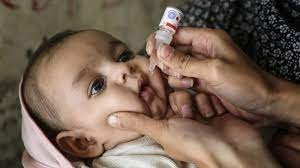In the environmental samples of Peshawar, confirmation of the poliovirus has been achieved, and the virus genetically relates to the poliovirus present in Afghanistan. Health Secretary, Dr. Iftikhar Ali Shalwani, stated that multiple polio campaigns are being organized in the country.
He mentioned that all necessary measures are being taken to eradicate polio, and appropriate strategies are formulated where the virus is detected. The Health Secretary emphasized that the polio eradication program is determined throughout the country.
He further added that parents should ensure the administration of polio drops to their children in every campaign. According to the Ministry of Health’s spokesperson, the number of positive environmental samples in the country has reached 15 in the current year
Poliovirus is a highly contagious virus that primarily affects young children. It can cause paralysis and even death in severe cases. The virus spreads through person-to-person contact, often through contaminated water or food. Efforts to eliminate polio have been underway for several decades, and significant progress has been made, with the number of polio cases globally decreasing significantly. However, isolated cases and outbreaks continue to occur in certain areas, particularly in regions with low vaccination coverage and inadequate sanitation.
The detection of poliovirus in an environmental sample in Peshawar suggests that the virus is still circulating in the local population, even if no clinical cases of paralysis have been reported. Environmental surveillance involves regularly testing sewage and water samples for the presence of poliovirus, as it can shed from the bodies of infected individuals and enter the environment through feces. This type of surveillance provides a way to monitor the circulation of the virus even when no active cases of paralysis are identified.
The positive sample underscores the importance of maintaining high vaccination coverage rates in the population. Polio vaccination campaigns are a critical component of the global eradication strategy. The oral polio vaccine (OPV) and inactivated polio vaccine (IPV) have proven to be effective tools in preventing the spread of the virus. However, challenges such as vaccine hesitancy, inadequate healthcare infrastructure, and security concerns have hindered vaccination efforts in certain regions.



